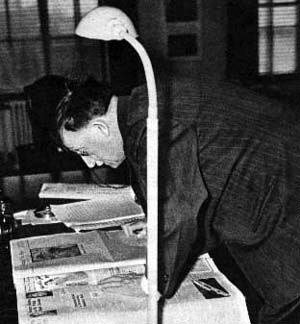Search | Image Archive | Reference | Communities | POV | Lesson Plans | Credits
 Although he never held elected office, John W. Dafoe was one of the most influential political figures in Canada in the first half of the twentieth century. As editor of the Manitoba Free Press (later the Winnipeg Free Press), he was an articulate champion of Liberalism, of Western Canada, and of a national and international vision for Canada.
Although he never held elected office, John W. Dafoe was one of the most influential political figures in Canada in the first half of the twentieth century. As editor of the Manitoba Free Press (later the Winnipeg Free Press), he was an articulate champion of Liberalism, of Western Canada, and of a national and international vision for Canada.
John Wesley Dafoe was born in Upper Canada (Ontario) in 1866, and after a twenty year career as a journalist, took the position of senior editor at the Manitoba Free Press, a Winnipeg newspaper that was owned by Brandon lawyer and then Minister of the Interior Clifford Sifton.
Sifton and Dafoe, although they disagreed on several fundamental matters of policy, like reciprocity, shared a deep commitment to Liberalism and a belief in the destiny of the west. Both believed that the development of the west was central to the prosperity of Canada as a whole, and they pressed the Laurier government to make western development a central policy of the federal government.
Dafoe championed a number of issues that reflected the priority he attached to western development. He campaigned for an end to vestiges of John A. Macdonald's National Policy like the monopoly on railway construction given to the C.P.R. and high freight rates. He used his editorials to call for for the establishment of the Hudson Bay Railway and supported Sifton's immigration policies.
Dafoe was also sensitive to the opposition in his province to the conscription plans of the Borden government in 1916-7, and together with Sifton led a revolt of Western Liberals that delayed the entrance of Laurier and the Liberals into the Union government. He recognized that many Westerners saw themselves and their country as detached from Great Britain, and understood the opposition to conscription of the French community.
Dafoe had an understanding of what it meant to be Canadian that sometimes alienated him from other social élites, and he was sometimes called anti-British. He saw Canada as a Dominion rather than a British colony, and he supported the creation of the Commonwealth.
While Dafoe was sympathetic to Canadian nationalism, perhaps his greatest weakness lay in his lack of sympathy for the actions of working people and his opposition to the principles of labour unionism. In 1919, he cut short his visit to the Paris Peace Conference to return to Winnipeg at the time of the General Strike. Dafoe held back nothing in his bitter condemnation of the leaders of the strike, and published a series of editorials in which he labelled the strikers as communist revolutionaries under the influence of enemy aliens and the Bolshevik government in the newly formed Soviet Union.
Dafoe remained editor of the Free Press until his death in 1942, and in this period declined offers of a knighthood and federal cabinet posts. He enjoyed the prestige and power wielded by the editor of what was then the most influential Western Canadian newspaper.
Page revised: 27 August 2009